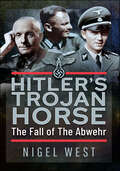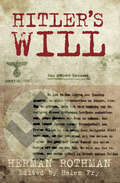- Table View
- List View
Hitler's Olympics: The 1936 Berlin Olympic Games
by Christopher HiltonThe Berlin Olympic Games, more than 70 years on, remain the most controversial ever held. This book creates a vivid account of the disputes, the personalities, and the events which made these Games so memorable. Ironically, the choice of Germany as the host nation for the 1936 Olympics was intended to signal its return to the world community after defeat in World War I. In actuality, Hitler intended the Berlin Games to be an advertisement for Germany as he was creating it, and they became one of the largest propaganda exercises in history. Two Germans Jews competed in the Games while the most memorable achievement was that of black American Jesse Owens, who won four gold medals. Ultimately, however, Germany was the overall biggest medal winner. The popular success of Owens allowed the Nazis to claim that their policies had no racial element and charges of antisemitism that did arise were leveled at the Americans.
Hitler's Olympics: The 1936 Berlin Olympic Games
by Christopher HiltonThe Berlin Olympic Games, more than 70 years on, remain the most controversial ever held. This book creates a vivid account of the disputes, the personalities, and the events which made these Games so memorable. Ironically, the choice of Germany as the host nation for the 1936 Olympics was intended to signal its return to the world community after defeat in World War I. In actuality, Hitler intended the Berlin Games to be an advertisement for Germany as he was creating it, and they became one of the largest propaganda exercises in history. Two Germans Jews competed in the Games while the most memorable achievement was that of black American Jesse Owens, who won four gold medals. Ultimately, however, Germany was the overall biggest medal winner. The popular success of Owens allowed the Nazis to claim that their policies had no racial element and charges of antisemitism that did arise were levelled at the Americans.
Hitler's People: The Faces of the Third Reich
by Richard J Evans&“A fascinating and instructive book . . . elegantly written and perceptive.&” —Wall Street Journal&“Kaleidoscopic . . . A fascinating exploration of individual agency that never loses sight of the larger context . . . Just the kind of probing, nuanced and unsparing study to help us think things through.&” —The New York TimesThrough a connected set of biographical portraits of key Nazi figures that follows power as it radiated out from Hitler to the inner and outer circles of the regime&’s leadership, one of our greatest historians answers the enduring question, how does a society come to carry out a program of unspeakable evil?Richard Evans, author of the acclaimed The Third Reich Trilogy and over two dozen other volumes on modern Europe, is our preeminent scholar of Nazi Germany. Having spent half a century searching for the truths behind one of the most horrifying episodes in human history, in Hitler&’s People, he brings us back to the original site of the Nazi movement: namely, the lives of its most important members.Working in concentric circles out from Hitler and his closest allies, Evans forms a typological framework of Germany society under Nazi rule from the top down. With a novelist&’s eye for detail, Evans explains the Third Reich through the personal failings and professional ambitions of its members, from its most notorious deputies—like Goebbels, the regime&’s propagandist, and Himmler, the Holocaust&’s chief architect—to the crucial enforcers and instruments of the Nazi agenda that history has largely forgotten—like the schoolteacher Julius Streicher and the actress Leni Riefenstahl. Drawing on a wealth of recently unearthed historical sources, Hitler&’s People lays bare the inner and outer lives of the characters whose choices led to the deaths of millions.Nearly a century after Hitler&’s rise, the leading nations of the West are once again being torn apart by a will to power. By telling the stories of these infamous lives as human lives, Evans asks us to grapple with the complicated nature of complicity, showing us that the distinctions between individual and collective responsibility—and even between pathological evil and rational choice—are never easily drawn.
Hitler's Pre-emptive War: The Battle for Norway, 1940
by Henrik O. LundeAn &“excellent&” history of the often overlooked WWII campaign in which Hitler secured a vital resource lifeline for the Third Reich (Library Journal). After Hitler conquered Poland and was still fine-tuning his plans against France, the British began to exert control over the coastline of neutral Norway, an action that threatened to cut off Germany&’s iron-ore conduit to Sweden and outflank from the start its hegemony on the Continent. The Germans responded with a dizzying series of assaults, using every tool of modern warfare developed in the previous generation. Airlifted infantry, mountain troops, and paratroopers were dispatched to the north, seizing Norwegian strongpoints while forestalling larger but more cumbersome Allied units. The German navy also set sail, taking a brutal beating at the hands of Britannia, but ensuring with its sacrifice that key harbors would be held open for resupply. As dive-bombers soared overhead, small but elite German units traversed forbidding terrain to ambush Allied units trying to forge inland. At Narvik, some six thousand German troops battled twenty thousand French and British until the Allies were finally forced to withdraw by the great disaster in France, which had then gotten underway. Henrik Lunde, a native Norwegian and former US Special Operations colonel, has written the most objective account to date of a campaign in which twentieth-century military innovation found its first fertile playing field.
Hitler's Priest (Hitler's Priest Ser.)
by S.J. TagliareniA brilliant young atheist in Weimar Germany finds himself among Hitler&’s inner circle—as his moral conscience—in this debut historical thriller.Hans Keller was always highly intelligent—so much so that he learned to place little value in what the school or church tries to teach him. But after a chance meeting with the charismatic Josef Goebbels, a leader of the burgeoning Nazi Party, atheistic Hans is offered a key role in shaping the future of the new Germany: providing essential influence within the Catholic Church. As the nation prepares for war, Hans finds himself gaining power in a shadowy world of manipulation and deceit. He soon rises to a level of ultimate status—and ultimate compromise—as Hitler&’s personal priest. In this original thriller full of fascinating period detail, author and former priest S. J. Tagliareni offers a rare window into the psychological and moral conflicts raised by Nazi Germany and the Holocaust.
Hitler's Priestess
by Nicholas Goodrick-ClarkeIn this window onto the roots and evolution of international neo-Nazism, Nicholas Goodrick-Clarke reveals the powerful impact of one of fascism's most creative minds. Savitri Devi's influence on neo-Nazism and other hybrid strains of mystical fascism has been continuos since the mid-1960s. A Frenchwoman of Greek-English birth, Devi became an admirer of German National Socialism in the late 1920s. Deeply impressed by its racial heritage and caste-system, she emigrated to India, where she developed her racial ideology, in the early 1930s. Her works have been reissued and distributed through various neo-Nazi networks and she has been lionized as a foremother of Nazi ideology. Her appeal to neo-Nazi sects lies in the very eccentricity of her thought - combining Aryan supremacism and anti-Semitism with Hinduism, social Darwinisn, animal rights, and a fundamentally biocentric view of life - and has resulted in curious, yet potent alliances in radical ideology. As one of the earliest Holocaust deniers and the first to suggest that Adolf Hitler was an avatar-- a god come to earth in human form to restore the world to a golden age - Devi became a fixture in the shadowy neo-Nazi world. In Hitler's Priestess, Nicholas Goodrick-Clarke examines how someone with so little tangible connection to Nazi Germany became such a powerful advocate of Hitler's misanthropy. Hitler's Priestess illuminates the life of a woman who achieved the status of a prophetess for her penchant for redirecting authentic religious energies in the service of regenerate fascism.
Hitler's Religion: The Twisted Beliefs that Drove the Third Reich
by Richard WeikartFor a man whom history can never forget, Adolf Hitler remains a persistent mystery on one front-his religious faith. Atheists tend to insist Hitler was a devout Christian. Christians counter that he was an atheist. And still others suggest that he was a practicing member of the occult. <P><P>None of these theories are true, says historian Richard Weikart. Delving more deeply into the question of Hitler's religious faith than any researcher to date, Weikart reveals the startling and fascinating truth about the most hated man of the 20th century: Adolf Hitler was a pantheist who believed nature was God. <P><P>In Hitler's Religion, Weikart explains how the laws of nature became Hitler's only moral guide-how he became convinced he would serve God by annihilating supposedly "inferior" human beings and promoting the welfare and reproduction of the allegedly superior Aryans in accordance with racist forms of Darwinism prevalent at the time.
Hitler's Rival: Ernst Thälmann in Myth and Memory
by Russel Lemmons“Fascinating material . . . This book will likely be the last word and the standard work on the Thälmann myth and its role in East German history.” —Catherine Epstein, author of Nazi Germany: Confronting the MythsThroughout the 1920s, German politician and activist Ernst Thälmann (1886–1944) was the leader of the largest Communist Party organization outside the Soviet Union. Thälmann was the most prominent left-wing politician in the country’s 1932 election and ran third in the presidential race after Hitler and von Hindenberg. After the Nazi Party’s victory in that contest, he was imprisoned and held in solitary confinement for eleven years before being executed at Buchenwald concentration camp in 1944 under the Führer’s direct orders.Hitler’s Rival examines how the Communist Party gradually transformed Thälmann into a fallen mythic hero, building a cult that became one of their most important propaganda tools in central Europe. Author Russel Lemmons analyzes the party intelligentsia’s methods, demonstrating how they used various media to manipulate public memory and exploring the surprising ways in which they incorporated Christian themes into their messages. Examining the facts as well as the propaganda, this unique volume separates the intriguing true biography of the cult figure from the fantastic myth that was created around him.“Lemmons analyzes in great detail the myth and legend that formed around Ernst Thälmann, who became the leader of the German Communist Party in 1925 and was a dominant politician in Weimar Germany until imprisoned by the Nazis in 1933. This comprehensive study, which treats the years before the war ended for the first time, is thoroughly researched and well written; it will be a standard work on the subject.” —G. P. Blum, Professor Emeritus, University of the Pacific
Hitler's Shadow Empire: Nazi Economics and the Spanish Civil War
by Pierpaolo BarbieriA revealing look at Nazi involvement in the Spanish Civil War, their economic ambitions, how it came to be, and how they operated.Pitting fascists and communists in a showdown for supremacy, the Spanish Civil War has long been seen as a grim dress rehearsal for World War II. Francisco Franco’s Nationalists prevailed with German and Italian military assistance—a clear instance, it seemed, of like-minded regimes joining forces in the fight against global Bolshevism. In Hitler’s Shadow Empire Pierpaolo Barbieri revises this standard account of Axis intervention in the Spanish Civil War, arguing that economic ambitions—not ideology—drove Hitler’s Iberian intervention. The Nazis hoped to establish an economic empire in Europe, and in Spain they tested the tactics intended for future subject territories.The Nazis provided Franco’s Nationalists with planes, armaments, and tanks, but behind this largesse was a Faustian bargain. Through weapons and material support, Germany gradually absorbed Spain into an informal empire, extending control over key Spanish resources in order to fuel its own burgeoning war industries. This plan was only possible and profitable because of Hitler’s economic czar, Hjalmar Schacht, a “wizard of international finance.” His policies fostered the interwar German recovery and consolidated Hitler’s dictatorship. Though Schacht’s economic strategy was eventually abandoned in favor of a very different conception of racial empire, Barbieri argues it was in many ways a more effective strategic option for the Third Reich.Deepening our understanding of the Spanish Civil War by placing it in the context of Nazi imperial ambitions, Hitler’s Shadow Empire illuminates a fratricidal tragedy that still reverberates in Spanish life as well as the world war it heralded.Praise for Hitler’s Shadow Empire“A fascinating, beautifully written account of a plan for the German economic domination of Europe that was pushed in the 1930s by the Nazis but above all by non-Nazi and more traditionally oriented German economic bureaucrats. Barbieri makes us think again about the relationship between economics and racial policies in the making of Nazi aggression.” —Harold James, author of Making the European Monetary Union“Hitler’s Shadow Empire recasts our understanding of the German and Italian interventions in the Spanish Civil War. In this brilliant debut, Barbieri shows that informal imperialism played a more important part than fascist ideology in the way that Berlin looked at the conflict. Barbieri also has a keen ear for the continuing echoes of the Civil War for Spain—and indeed for Europe—today.” —Niall Ferguson, author of The Ascent of Money
Hitler's Social Revolution: Class and Status in Nazi Germany 1933-1939
by David SchoenbaumBeginning with Germany's social situation after World War I, David Schoenbaum shows how Hitler improvised a program that apparently offered something to everyone--above all, the mirage of a classless society. In fact, the gap between the ideology of the Reich and its actual character was enormous. But under the spell of the mirage, the will to resist was undermined by an accelerating process of social disintegration.
Hitler's Spy
by James HaywardOriginally published as Double Agent Snow, Hitler's Spy is the paperback edition, which tells of how on the eve of the outbreak of the Second World War the double-agent Arthur Owens, codenamed SNOW, is summoned to Berlin and appointed Hitler's chief spy in Britain. Days later he finds himself in Wandsworth prison, betrayed by the wife he traded for a younger model, and forced to transmit false wireless messages for MI5 to earn his freedom - and avoid the hangman's noose. A vain and devious anti-hero with no moral compass, Owen's motives were status, money and women. He mixed fact with fiction constantly, and at times insisted that he was a true patriot, undertaking hazardous secret missions for his mother country; at other times, Owens saw himself as a daring rogue agent, outwitting British Intelligence and loyal only to the Fatherland. Yet in 1944, as Allied troops stormed the beaches of Normandy on D-Day, Hitler was caught unawares, tricked into expecting the invasion across the Pas de Calais in a strategic deception played out by Owens and the double-cross agents of MI5. For all his flaws, Agent Snow became the traitor who saved his country. Based on recently de-classified MI5 files and previously unpublished sources, Hitler's Spy is the story of a secret Battle of Britain, fought by Snow and his opposing spymasters, Thomas 'Tar' Robertson of MI5 and Nikolaus Ritter of the Abwehr, as well as the tragic love triangle between Owens, his wife Irene, and his mistress Lily Funnell. The evocative, fast-paced narrative moves from seedy south London pubs to North Sea trawlers, from chic Baltic spa resorts to Dartmoor gaol, populated by a colourful rogue's gallery of double-cross agents.
Hitler's Spy Against Churchill: The Spy Who Died Out in the Cold
by Jan-Willem van den BraakFrom the summer of 1940 until May 1941, nearly twenty German Abwehr agents were dropped by boat or parachute into England during what was known as Operation Lena, all in preparation for Hitler's planned invasion of England. The invasion itself would never happen and in fact, after the war, one of the Abwehr commanders declared that the operation was doomed to failure. There is no doubt that the operation did indeed become a fiasco, with almost all of the officers being arrested within a very brief period of time. Some of the men were executed, while others became double agents and spied for Britain against Germany. Only one man managed to stay at large for five months before eventually committing suicide: Jan Willem Ter Braak. Amazingly, his background and objectives had always remained unclear, and none of the other Lena spies had ever even heard of him. Even after the opening of the secret service files in England and the Netherlands over 50 years later, Jan Willem Ter Braak remained a 'mystery man', as the military historian Ladislas Farago famously described him. In this book, the author – his near-namesake – examines the short and tragic life of Jan Willem Ter Braak for the first time. Using in-depth research, he investigates the possibility that Ter Braak was sent to kill the British Prime Minister Winston Churchill and discovers why his fate has remained largely unknown for so long.
Hitler's Spy Chief: The Wilhelm Canaris Mystery
by Richard BassettHow Hitler's spy chief sabotaged the German war effort.Wilhelm Canaris was appointed by Hitler to head the Abwehr (the German secret service) 18 months after the Nazis came to power. But Canaris turned against the Fuhrer and the Nazi regime, believing that Hitler would start a war Germany could not win. In 1938 he was involved in an attempted coup, undermined by British Prime Minister Neville Chamberlain. In 1940 he sabotaged the German plan to invade England, and fed General Franco vital information that helped him keep Spain out of the war. For years he played a dangerous double game, desperately trying to keep one step ahead of the Gestapo. The SS chief, Heinrich Himmler, became suspicious of the Abwehr and by 1944, when Abwehr personnel were involved in the attempted assassination of Hitler, he had the evidence to arrest Canaris himself. Canaris was executed a few weeks before the end of the war.
Hitler's Spy Chief: The Wilhelm Canaris Mystery
by Richard BassettHow Hitler's spy chief sabotaged the German war effort.Wilhelm Canaris was appointed by Hitler to head the Abwehr (the German secret service) 18 months after the Nazis came to power. But Canaris turned against the Fuhrer and the Nazi regime, believing that Hitler would start a war Germany could not win. In 1938 he was involved in an attempted coup, undermined by British Prime Minister Neville Chamberlain. In 1940 he sabotaged the German plan to invade England, and fed General Franco vital information that helped him keep Spain out of the war. For years he played a dangerous double game, desperately trying to keep one step ahead of the Gestapo. The SS chief, Heinrich Himmler, became suspicious of the Abwehr and by 1944, when Abwehr personnel were involved in the attempted assassination of Hitler, he had the evidence to arrest Canaris himself. Canaris was executed a few weeks before the end of the war.
Hitler's Spy Princess: The Extraordinary Life of Stephanie von Hohenlohe
by Martha Schad‘Hold on to this letter, so that it will be evidence of how accurately I have kept you informed. I’m serious; don’t throw this letter away.’BORN the illegitimate daughter of Jewish parents, Princess Stephanie von Hohenlohe would rise to dizzying heights in international politics, hobnobbing with European royalty, British aristocracy – and high-ranking Nazis. She was the unofficial go-between for some of the most important people of the era, conveying secret messages and organising meetings between Adolf Hitler, Lord Rothermere, the Duke and Duchess of Windsor and more than one US president. She would even be one of only a handful of women to be awarded the Nazi Party’s Gold Medal for ‘outstanding service to the National Socialist movement’.But then the Second World War began, and everything changed.Hitler’s Spy Princess is a tale of lovers and manipulation, cleverness and deceit in the remarkable life of the woman Hitler called his ‘dear princess’.
Hitler's Stormtroopers: The SA, The Nazis' Brownshirts, 1922–1945
by Jean-Denis LepageThe Sturm Abteilung der NSDAP (SA, assault battalion of the Nazi party) created in August 1920 were squads of strong arms intended to protect the Nazis meetings, to provoke disturbance, to break up other parties meetings, and to attack and assault political opponents as part of a deliberate campaign of intimidation. After 1925 the name Braunhemden (Brownshirts) was also given to its members because of the colour of their uniforms. Under the leadership of Hitlers close political associate, Ernst Rhm, the SA grew to become a huge and radical paramilitary force. This book answers several questions concerning the SA. How did the SA become a national movement? What was the relationship between Rhm and Hitler? What role did the SA play in providing Hitler with the keys to power? After the seizure of power by the Nazis on January 30, 1933, what was the function of the Brownshirts? Why did the brutal and scandalous Ernst Rhm stand in Hitlers way? What became of the SA after the bloody purge of June 1934, the notorious Night of the Long Knives?
Hitler's Traitors: Dissent, Espionage and the Hunt for Resisters
by Edward HarrisonThis collection of vivid essays examines some of the most fascinating aspects of the German resistance to Hitler. It includes the first translations into English of pioneering studies on the role of a leading Nazi in the July Plot, the flight of Rudolf Hess to Britain and the vigorous controversy over Hugh Trevor-Roper’s investigation of Hitler’s death. The book also explores vociferous Catholic dissent in Franconia and the conspiracies against the Third Reich of the revolutionary New Beginning movement. Through the study of important personalities and dramatic events this book explores the possibilities and challenges faced by Germans in attempts to frustrate and defy Hitler’s tyranny.
Hitler's Trojan Horse: The Fall of the Abwehr, 1943–1945
by Nigel West"Nigel West has presented the most complete account of the Abwehr to date. It will serve as a valuable reference work." — Studies in IntelligenceAs the Second World War progressed and defeat for Hitler’s Third Reich in all theatres became ever more certain, the tight Abwehr network, built so effectively by its head, Admiral Canaris, began to unravel. High-level defections to the Allies and bitter disputes with the Sicherheitsdienst (SD) added to a collapse in morale. Most notably was the increasing opposition within the officer ranks of the Army to Hitler fermented by Canaris and his deputy Generalmajor Hans Oster. The final years of the Abwehr were marked by the Abwehr’s efforts to undermine the regime, which came to a bloody conclusion following the Valkyrie assassination attempt of 20 July 1944. This saw the arrest of many Abwehr officials and the execution of Canaris and Oster. In this penetrating study of the final years of the Abwehr, Nigel West, a world-renowned specialist in the field, pieces together the gradual decline in the organization’s role and importance with Hitler and his acolytes paying little heed to reports that were increasingly cautionary. Among the many previously undisclosed stories are details gleaned from recently opened files which tell of a hitherto unknown spy-swap. This was the exchange of Berthold Shulze-Holthus, a German spy detained in Iran, for Ferdinand Rodriguez, a British radio operator captured in France. This was the only such exchange that took place during the whole of the Second World War – though the fact that the swap took place at all suggests that a previously unsuspected degree of communication existed between the Allies and Nazi Germany. Perhaps most tantalizingly of all, is the new night light thrown upon the role the British Secret Intelligence Service, MI6, had, in league with the Abwehr, in the Valkyrie bombing which almost killed Hitler.
Hitler's Valkyrie: The Uncensored Biography of Unity Mitford
by David R L. LitchfieldEmerging from modern history as a remarkable and much-loved family, the Mitfords have remained largely unrepentant concerning theirs and particularly Unity’s enthusiastic support of Hitler, the Nazis, Oswald Mosley and British fascism. However, having initially encouraged and supported Unity’s affair with Hitler, they subsequently insisted that she had in fact been a rather unintelligent, clumsy lump of a girl, whose virginal relationship with one of the most terrifying dictators of all time was a mere unrequited romantic obsession. As this book will show, nothing could be further from the truth. Following further research and reexamination of the family’s, friends’ and journalists’ often contradictory evidence, plus new information supplied by the author’s own family and friends, Hitler’s Valkyrie will reveal that while Unity was, like Hitler, an extreme fantasist, there was very little of the juvenile romantic about her. On the contrary, she was highly intelligent, free-spirited and athletic. She was also the only Englishwoman who came close to being capable of changing the course of the Second World War. Here David R.L. Litchfield untangles the decades-old web of intrigue surrounding Unity Mitford and one of the most dangerous men of all time, creating a fascinating book of unparalleled importance to the Mitford legacy.
Hitler's Will
by Helen Fry Herman RothmanHerman Rothman arrived in Britain from Germany as a Jewish refugee in 1939, on the eve of the Second World War. He volunteered for HM Forces, serving in the Intelligence Corps, and in 1945 was posted to Westertimke and Fallingbostel prisoner of war camps to interrogate high-ranking Nazi war criminals. When papers were discovered sewn into the shoulders of a jacket belonging to Heinz Lorenz, who had been Joseph Goebbels' press secretary, he and a team of four others were charged with translating them under conditions of the deepest secrecy. The documents turned out to be the originals of Hitler's personal and political wills, and Goebbels' addendum. Later, in Rotenburg hospital, Rothman interrogated Hermann Karnau, who had been a police guard in Hitler's bunker, to establish informaiton about the Fuhrer's death. 'Hitler's Will' is the amazing true story of Herman Rothman's remarkable life, including how he managed to escape from Nazi Germany before the War began, and his role in bringing to light Hitler's personal and political testaments.
Hitler's Willing Executioners: Ordinary Germans and the Holocaust
by Simon Taylor Tom StammersDaniel Goldhagen's study of the Holocaust offers conclusions that run directly counter to those reached by Christopher Browning, whose book Ordinary Men is also the subject of a Macat analysis. As such, the two analyses make possible some interesting critical thinking exercises focused on evaluation of the evidence used by the two historians. For Goldhagen, a chief reason for German actions was not the mundane good comradeship stressed by Browning, but a longstanding hatred of Jews and Judaism specific to Germany that dated back well into the previous century. Debating which historian is right, which has made better use of the available evidence, which has most successfully written objectively – and which advances the most secure interpretation of contested documents – forces students to think critically about one of the most important and (on the surface at least) incomprehensible events of the past century.
Hitler's World View: A Blueprint for Power
by Eberhard Jäckel Herbert ArnoldEven the demonic Hitler had a comprehensive philosophy, and Jäckel probes deeply into the dictator's mind to determine how he viewed the world.
Hitler: 1889-1936 Hubris
by Ian KershawThis is a biography of Hitler from birth to 1936, and his creation of The Third Reich, i.e., Nazi Germany.
Hitler: 1889-1936 Hubris
by Ian KershawHailed as the most compelling biography of the German dictator yet written, Ian Kershaw's Hitler brings us closer than ever before to the heart of its subject's immense darkness. From his illegitimate birth in a small Austrian village to his fiery death in a bunker under the Reich chancellery in Berlin, Adolf Hitler left a murky trail, strewn with contradictory tales and overgrown with self-created myths. One truth prevails: the sheer scale of the evils that he unleashed on the world has made him a demonic figure without equal in this century. Ian Kershaw's Hitler brings us closer than ever before to the character of the bizarre misfit in his thirty-year ascent from a Viennese shelter for the indigent to uncontested rule over the German nation that had tried and rejected democracy in the crippling aftermath of World War I. With extraordinary vividness, Kershaw recreates the settings that made Hitler's rise possible: the virulent anti-Semitism of prewar Vienna, the crucible of a war with immense casualties, the toxic nationalism that gripped Bavaria in the 1920s, the undermining of the Weimar Republic by extremists of the Right and the Left, the hysteria that accompanied Hitler's seizure of power in 1933 and then mounted in brutal attacks by his storm troopers on Jews and others condemned as enemies of the Aryan race. In an account drawing on many previously untapped sources, Hitler metamorphoses from an obscure fantasist, a "drummer" sounding an insistent beat of hatred in Munich beer halls, to the instigator of an infamous failed putsch and, ultimately, to the leadership of a ragtag alliance of right-wing parties fused into a movement that enthralled the German people. This volume, the first of two, ends with the promulgation of the infamous Nuremberg laws that pushed German Jews to the outer fringes of society, and with the march of the German army into the Rhineland, Hitler's initial move toward the abyss of war.
Hitler: A Global Biography
by Brendan SimmsFrom a prize-winning historian, the definitive biography of Adolph HitlerHitler offers a deeply learned and radically revisionist biography, arguing that the dictator's main strategic enemy, from the start of his political career in the 1920s, was not communism or the Soviet Union, but capitalism and the United States. Whereas most historians have argued that Hitler underestimated the American threat, Simms shows that Hitler embarked on a preemptive war with the United States precisely because he considered it such a potent adversary. The war against the Jews was driven both by his anxiety about combatting the supposed forces of international plutocracy and by a broader desire to maintain the domestic cohesion he thought necessary for survival on the international scene.A powerfully argued and utterly definitive account of a murderous tyrant we thought we understood, Hitler is essential reading for anyone seeking to understand the origins and outcomes of the Second World War.























